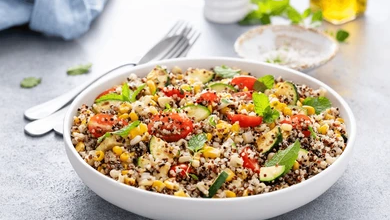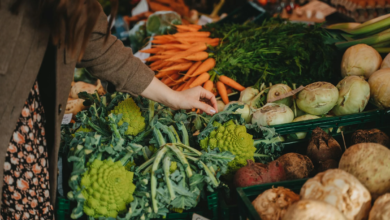Eco-Friendly Food Choices: Top Tips for Sustainable Eating
Learn practical tips for sustainable eating and make eco-friendly food choices that benefit your health and the planet. Start now!

Hey there! Have you ever thought about how your food choices impact the environment? Sustainable eating is all about making food choices that are good for both you and the planet. By opting for eco-friendly foods, you can reduce your carbon footprint, conserve resources, and support ethical farming practices. In this article, we’ll dive into some practical tips that can help you eat sustainably without sacrificing taste or convenience. Let’s get started!
What is Sustainable Eating?
Sustainable eating means selecting foods that are produced in a way that is kind to the environment and socially responsible. This includes choosing foods with a lower environmental impact, such as those that use fewer resources and are produced with ethical practices. When we eat sustainably, we help reduce greenhouse gas emissions, conserve water and energy, and promote biodiversity.
Why Choose Eco-Friendly Food Options?
Opting for eco-friendly food choices offers several benefits:
- Reduced Carbon Footprint: Sustainable foods typically require fewer resources and produce fewer emissions during production and transportation.
- Conservation of Natural Resources: Choosing sustainably grown foods helps conserve water, soil, and energy.
- Supporting Ethical Farming Practices: Eco-friendly food choices support farmers who use humane and ethical practices, ensuring fair treatment of workers and animals.
Practical Tips for Sustainable Eating
Buy Local and Seasonal Produce
One of the easiest ways to eat sustainably is to buy local and seasonal produce. Local foods don’t have to travel long distances, which means fewer emissions from transportation. Plus, seasonal produce is often fresher and tastes better because it’s picked at its peak. Check out your local farmers’ markets or join a CSA (Community Supported Agriculture) to get fresh, local produce.
Choose Organic and Non-GMO Foods
Organic farming avoids the use of synthetic pesticides and fertilizers, which can harm the environment. Non-GMO foods are produced without genetic modification, promoting biodiversity and reducing the reliance on chemical inputs. Look for labels like USDA Organic or Non-GMO Project Verified when you shop.
Reduce Meat and Dairy Consumption
Meat and dairy production are major contributors to greenhouse gas emissions. By reducing your consumption of these products, you can make a big impact on the environment. Try incorporating more plant-based foods into your diet. You don’t have to go completely vegetarian or vegan; even small changes, like having one meat-free day a week, can make a difference.
Opt for Plant-Based Alternatives
Plant-based diets are not only healthier but also more sustainable. Foods like beans, lentils, tofu, and tempeh are excellent sources of protein and have a much lower environmental impact compared to meat. Experiment with new recipes and discover delicious plant-based meals that you enjoy.
Minimize Food Waste
Food waste is a huge problem, but there are many ways to minimize it. Plan your meals ahead of time and only buy what you need. Use leftovers creatively by turning them into new meals, like soups, stews, or stir-fries. Composting food scraps is another great way to reduce waste and recycle nutrients back into the soil.
Sustainable Food Shopping
Bring Reusable Bags and Containers
Cut down on single-use plastics by bringing your own reusable bags and containers when you shop. This simple switch can significantly reduce the amount of plastic waste that ends up in landfills and oceans. Keep a stash of reusable bags in your car or by the front door so you don’t forget them when you go shopping.
Shop at Farmers’ Markets
Farmers’ markets offer a variety of local and seasonal produce. By shopping at these markets, you support local farmers and reduce the environmental impact of food transportation. Plus, you often get the chance to talk directly with the farmers and learn more about how your food is grown.
Look for Eco-Friendly Certifications
When shopping, look for certifications like Fair Trade, Rainforest Alliance, and USDA Organic. These labels indicate that the products meet certain environmental and social standards. Fair Trade certification, for example, ensures that farmers receive fair wages and work under safe conditions.
Avoid Heavily Packaged Products
Choose products with minimal packaging to reduce waste. Bulk bins are a great option for purchasing items like grains, nuts, and spices without unnecessary packaging. Bring your own containers to fill up at the bulk bins, and avoid products wrapped in excessive plastic.
Growing Your Own Food
Benefits of Home Gardening
Growing your own food can be incredibly rewarding. It reduces the need for transportation, ensures that you know exactly how your food is produced, and can save you money. Plus, it’s a great way to get outside, get some exercise, and enjoy nature.
Tips for Starting a Vegetable Garden
Starting a garden doesn’t have to be complicated. Begin with a few easy-to-grow vegetables like tomatoes, lettuce, and herbs. Use organic seeds and compost to enrich the soil. If you don’t have a yard, consider container gardening on a balcony or patio. Gardening can be a fun and educational activity for the whole family.
Composting Kitchen Scraps
Composting is an excellent way to recycle kitchen scraps into valuable fertilizer for your garden. It reduces waste and provides nutrients to your plants. You can compost fruit and vegetable peels, coffee grounds, eggshells, and more. If you don’t have space for a compost bin, consider a small indoor composting system or a community composting program.
Eating Out Sustainably
Choose Restaurants with Sustainable Practices
Many restaurants are now adopting sustainable practices. Look for places that source local ingredients, use eco-friendly packaging, and have a focus on reducing waste. Websites and apps like Yelp and HappyCow can help you find sustainable dining options in your area.
Opt for Plant-Based Menu Items
When dining out, choose plant-based dishes. Many restaurants offer delicious vegetarian and vegan options that are both healthy and sustainable. Don’t be afraid to ask your server about the ingredients and preparation methods to ensure your meal aligns with your values.
Support Local Eateries
Local restaurants often source ingredients from nearby farms, reducing the environmental impact of food transportation. Supporting these establishments also helps the local economy. Look for restaurants that highlight local ingredients on their menu and ask about their sourcing practices.
Sustainable eating is a powerful way to contribute to a healthier planet while also improving your own well-being. By making small changes in your food choices, you can reduce your environmental footprint and support ethical practices in the food industry. Whether you start by buying local produce, reducing meat consumption, or growing your own vegetables, every little bit helps. Start your journey towards sustainable eating today and make a positive impact on the world around you.
What are your favorite eco-friendly food choices? Share your tips and experiences in the comments below, and follow us on social media for more sustainable living tips and recipes! Together, we can make a difference and create a healthier, more sustainable future.
For more tips on creating delicious and nutritious meals, check out our article “Cook Healthy Meals Without Sacrificing Flavor: 10 Practical Tips.” This guide offers easy and practical advice to help you enhance your cooking while maintaining great taste. Dive in to discover how you can make healthy eating enjoyable and flavorful!
For those looking to dive deeper into making eco-friendly food choices, the Environmental Working Group (EWG) offers a fantastic resource through their Organic Food Guide. This guide provides invaluable information on which organic products to prioritize, helping you navigate the complexities of organic shopping. By consulting the EWG’s guide, you can make informed decisions that support your health and the environment, ensuring that you select foods free from harmful pesticides and produced using sustainable practices.
QAR
Q: What is sustainable eating? A: Sustainable eating means selecting foods that are produced in a way that is kind to the environment and socially responsible. This includes choosing foods with a lower environmental impact, such as those that use fewer resources and are produced with ethical practices. Sustainable eating helps reduce greenhouse gas emissions, conserve water and energy, and promote biodiversity.
Q: How can we reduce meat and dairy consumption?
A: Reducing meat and dairy consumption can be achieved by incorporating more plant-based foods into your diet. You don’t have to go completely vegetarian or vegan; even small changes, like having one meat-free day a week, can make a difference. Plant-based alternatives like beans, lentils, tofu, and tempeh are excellent sources of protein and have a much lower environmental impact compared to meat.
Q: How can growing your own food contribute to sustainability?
A: Growing your own food reduces the need for transportation, ensures that you know exactly how your food is produced, and can save you money. It also provides a great way to get outside, get some exercise, and enjoy nature. Composting kitchen scraps is an excellent way to recycle nutrients back into the soil, reducing waste and providing valuable fertilizer for your garden.
Q: What are some ways to eat out sustainably?
A: When eating out, choose restaurants with sustainable practices, such as those that source local ingredients, use eco-friendly packaging, and focus on reducing waste. Opt for plant-based menu items and support local eateries that often source ingredients from nearby farms, reducing the environmental impact of food transportation.




